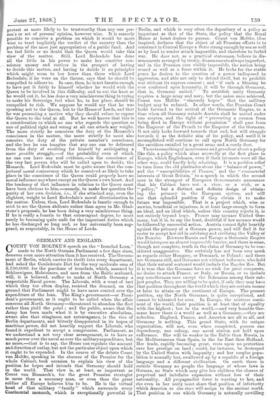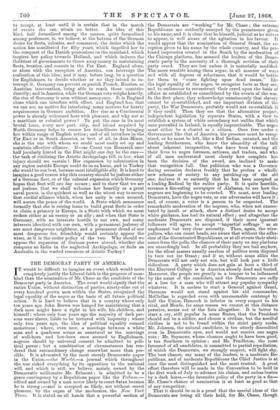GERMANY AND ENGLAND.
COUNT VON MOLTKE'S speech on the "Ironclad Loan," made to the North German Parliament a few days since, deserves even more attention than it has received. The Govern- ment of Berlin, which carries its thrift into every department, had asked the Confederate Diet for the very moderate sum of 3,750,000/. for the purchase of ironclads, which, manned by Schleswigers, Holsteiners, and men from the Baltic seaboard, will, it is believed, suffice to make of North Germany a respectable Naval power. The Liberals, with a want of tact which they too often display, resisted the demand, on the ground that Parliament ought to have more control over the expenditure of the loan. The King's government—or Presi- dent's government, as it ought to be called when the affair concerns all North Germany—threatened to abandon the fleet rather than yield the point ; and the public, aware that the Army has been made what it is by executive absolutism, aware also that stinginess, not extravagance, is the vice of Berlin departments, and bitterly disappointed in its hopes of maritime power, did not heartily support the Liberals, who found it expedient to accept a compromise. Parliament, as we understand a not very clear arrangement, is to have as much power over the naval as over the militaryexpenditure, but no more,—that is to say, the House can regulate the amount and direction of outlay, but not the particular object upon which it ought to be expended. In the course of the debate Count von Moltke, speaking in the absence of the Premier for the whole Cabinet, took occasion to explain his view of the position he hopes and intends that Germany should hold in the world. That view is, at least, as important as Count von Bismarck's, for the great Prussian strategist is more than a necessary man, or even than the great soldier all Europe believes him to be. He is the virtual head of that military " family " which surrounds every Continental monarch, which is exceptionally powerful in
Berlin, and which is very often the depositary of a policy as important as that of the State, the policy that the Royal House at heart desires to pursue. Count von Moltke, thus inspired, declares that the object of all Prussian efforts is to construct in Central Europe a State strong enough by sea as well as by land to render attack impossible, and therefore to forbid war. He does not, as a practical statesman, believe in dis- armaments arranged by treaty, disarmaments always imperfect, and in the Prussian case visibly impossible, the nation being armed as well as a force within it. He looks for the stable peace he desires to the creation of a power indisposed to aggression, and able not only to defend itself, but to prohibit war without its express consent ; and "if such a blessing be ever conferred upon humanity, it will be through Germany, that is, Germany united." To establish unity Germany requires a large army and navy, but the union once achieved, Count von Moltke " sincerely hopes " that the military budget may be reduced. In other words, the Prussian Court looks forward to the revival of the Germanic Empire, to a time when all Germany outside Austria shall be united under one sceptre, and the right of " preventing a cannon from being fired in Europe without permission " shall pass from the Emperor of the French to the Emperor of the Germans. It not only looks forward towards that end, but will struggle towards it as the definite aim of its policy, and until it is accomplished will continue to call upon North Germany for the sacrifices entailed by a great army and a costly fleet.
Thereissomethingof massiveness and grandeur about a policy like this, a policy which aims avowedly at the first place in Europe, which Englishmen, even if their interests were all the other way, could hardly help admiring. It is a positive relief to turn from the old platitudes about the balance of power," and the " susceptibilities of France," and the " commercial interests of Great Britain," to a speech in which the second man in the strongest of European Governments announces that his Cabinet have not a view, or a wish, or a " policy," but a distinct and definite design of obtain- ing the primacy in the European system, and will use that splendid position if they obtain it to make future war impossible. That is a project which, wise or unwise, beneficial or injurious, is at least large enough to form an ideal, and an ideal which, unless this country rejects it, is not entirely beyond hope. France may menace United Ger- many, but it is, to say the least, doubtful if her menace would be followed by successful action. Austria cannot fight heartily against the primacy of a German power, and will find it far easier to accept her aid in subduing and civilizing the Valley of the Danube. Between Russia and Europe a Germanic Empire would interpose an almost impassable barrier, and there is some, though not complete, truth in the claim of Germany to be con- sidered unaggressive. She certainly has not been very meek as regards either Hungary, or Denmark, or Poland ; and there are Germans still, and Germans not without influence, who hold that their natural seaboard would include the Zuyder Zee. But it is true that the Germans have no wish for great conquests, no desire to attack France, or Italy, or Russia, or to include any non-German race except the Bohemian among their sub- ject peoples. They are willing to be quiet, if only they may have that position throughout the world which they are certain sooner or later to attain on the continent of Europe. The present position, say the North Germans, is quite exceptional, and cannot be tolerated for ever. In Europe, the mistress conti- nent of the world, their position is at least that of equality with the highest ; but in the world,—and very humble Ger- mans know there is a world as well as a Germany,—they are nobodies. England, France, and America are all in all, and Germany is nothing. This grand State, with its unique organization, will not, even when completed, possess one dependency, one colony, one naval station not held upon sufferance. She will be weaker in the Baltic than Russia, in the Mediterranean than Spain, in the far East than Holland. Her trade, rapidly becoming great, rests upon no protection save her prestige on land ; could, for instance, he destroyed by the United States with impunity ; and her surplus popu- lation is annually lost, swallowed up by a republic of a foreign language and a different civilization. On earth there is outside Germany no people the language of whose laws is German, no State which may give her children the chance of perpetual and indefinite expansion without loss of their nationality. All propagandist force is wanting to her, and she even in her unity must share that position of inferiority which America as she rises will assign to the ancient world. That position is one which Germany is naturally unwilling
to accept, at least until it is certain that in the march of events she can attain no better. An idea of this kind, half formulized among the masses, quite formulized among professors, is, we believe, at the bottom of the German desire for fleets, colonies, and commerce, the desire which the nation has manifested for fifty years, which impelled her to the conquest of the Danish possessions on the mainland, which inspires her policy towards Holland, and which induces the thriftiest of governments to throw away money in maintaining fleets, treaties, and consuls in the Far East. England alone, or alone with the exception of America, can interrupt the realization of this idea; and it may, before long, be a question for Englishmen to decide whether or no they intend to in- terrupt it. Germany can prevent or punish French, Russian, or Austrian intervention, being able to reach those countries directly; and in America, while the German vote weighs heavily, the rise of Germany is seen without annoyance. It is England alone which can interfere with effect, and England has, that we can see, no motive for interfering, many motives for hearty acquiescence in German ambition. Her rise as a Continental power is already welcomed here with pleasure, and why not as a maritime or colonial power? To put the case in its most brutal form, every new port, ship, and island acquired by North Germany helps to ensure her friendliness by bringing her within range of English action; and of all intruders in the Far East or in South America, or best of all, in Asia Minor, she is the one with whom we could most easily set up and maintain effective alliance. If—as Count von Bismarck once half jocularly hinted in the Diet might one day be the case— the task of civilizing the Asiatic Archipelago fell to her, what injury should we sustain ? Her expansion by colonization in any region outside Europe could do us no harm, and in Turkey she would be our best, because most intelligible ally. It is hard to imagine a good reason why this country should be jealous either of a German fleet, or of the colonial expansion which Germany hopes that fleet will one day secure ; and to show that we are not jealous, that we shall welcome her heartily as a great naval power, is the quickest as well as the wisest way to secure that cordial affiance which, when her unity is once secured, will assure the peace of the world. A State which announces formally that she is raising loans to build great fleets in order to claim a primacy in Europe, is a State with which we must reckon either as an enemy or an ally ; and when that State is Germany, with no interests hostile to our own, and many interests identical with our own, with a permanent jealousy of our most dangerous neighbour, and a permanent dread of our most dangerous foe, friendship would certainly appear the wiser, as it is the easier policy of the two. Why should we oppose the expansion of German power abroad, whether she conquers an India in the neglected Archipelago, or finds an Australia in the wasted resources of Asiatic Turkey ?































 Previous page
Previous page